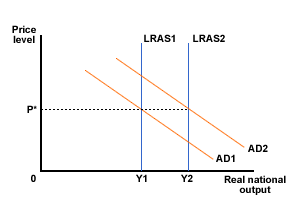Equilibrium in the long run
Syllabus: Equilibrium in the monetarist/new classical modelSyllabus: Explain, using a diagram, the determination of long-run equilibrium, indicating that
long-run equilibrium occurs at the full employment level of output.
Syllabus: Examine why, in the monetarist/new classical approach, while there may be short-term fluctuations in output, the economy will always return to the full employment level of output in the long run.
Syllabus: Examine, using diagrams, the impacts of changes in the long-run equilibrium.
If you would prefer to view this interaction in a new web window, then please follow the link below:
Non-inflationary growth
LRAS can be shifted through supply-side policies, and free market economists (Neoclassical) argue that, if these are used, the economy can grow in a non-inflationary way as in Figure 1 below. We will look at these policies in more detail in the next section.

Figure 1 Impact of supply-side policies
It is generally accepted that there is a relationship between output and employment and, that as output increases, so employment will rise. This seems easier to prove in the short term than it is in the long term. For example, if there is make a major breakthrough in technology then output will certainly increase, but will employment or will it cause unemployment?